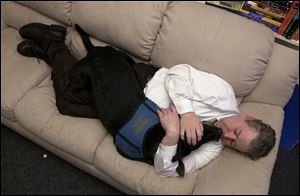
Toledo: His best friend really is his dog
1/26/2005
Mark Sherry and Wally.
All Mark Sherry wanted to do was cross a busy street in Brisbane, Australia. It was a decision that would instantly change his life on that calamitous day in 1992- he was hit and run over by a car in an accident that almost ended his life.
And even though he survived, it wasn't without life-changing consequences. He had a traumatic brain injury that left him with memory loss and epileptic seizures.
"One day, I was a young man with one script for my life. I was fit and healthy and I expected my life to go a certain way. In a split second my health became an issue I couldn't take for granted. My brain was so badly injured that I would have seizures for the rest of my life," Mr. Sherry, an Australian, explained.
The accident, which he had when he was 25, left him with punctured lungs, broken legs, and a torn stomach. He had to undergo eight operations in nine years, which took their toll.
"When you're continually having operations for many years, friends don't stay around," he said. "I was constantly depressed and had many mood swings."
All that changed eight years ago when Mr. Sherry, now 38, got his dog, Wally.
Wally's not just any dog. He's an Australian Kelpie work dog who helps Mr. Sherry in his struggle with epilepsy.
He got the dog in Australia as he was going through recovery, and trained Wally to recognize epileptic seizures and help him during a fit. He couldn't find any dogs trained to specifically help epileptics.
He is the first "seizure dog" in Toledo, said Mr. Sherry, the head of the disabilities studies department at the University of Toledo.
Scientists have only begun to explore the many uses of dogs in how "they can be used to better our understanding of many health issues," he said.
"He helps me before, during, and after my seizures. The smell of the increased perspiration that I go through lets him know that I'm going to have a seizure. He starts to whine and then gets my attention. He doesn't stop whining until he has my attention. He alerts me so that I can lie down when a seizure is about to happen so that I don't injure myself," he said.
In some instances, Wally has literally saved Mr. Sherry's life.
"Wally puts his tongue in my mouth when I stop breathing and other times he jumps on my stomach to wake me up," said Mr. Sherry who pursued a doctorate specializing in brain injuries after his accident. In April he will finish a manuscript for a book expected to be published later this year, If only I had a Brain.
Wally is also very helpful after a seizure.
"After a seizure he will not leave my side and most times I'm incredibly confused and I don't know which way is up. I look for Wally's head to know which way is up," said Mr. Sherry.
Wally is very work-oriented and responds easily to every signal.
"He keeps his eyes on me all the time," said Mr. Sherry. "He is an incredibly obedient and affectionate dog. He has both a medical and social role in my life. For many people with epilepsy, it's an invisible disability."
A member of the Mayor's Commission on Disabilities recently created by Toledo Mayor Jack Ford, Mr. Sherry will be giving his inaugural public lecture about living with epilepsy and many other disabilities in March at the University of Toledo.
"People with all sorts of disabilities have a long way to go in getting the same freedoms that other people take for granted," he said.
Contact Karamagi Rujumba at
krujumba@theblade.com or
419-724-6064